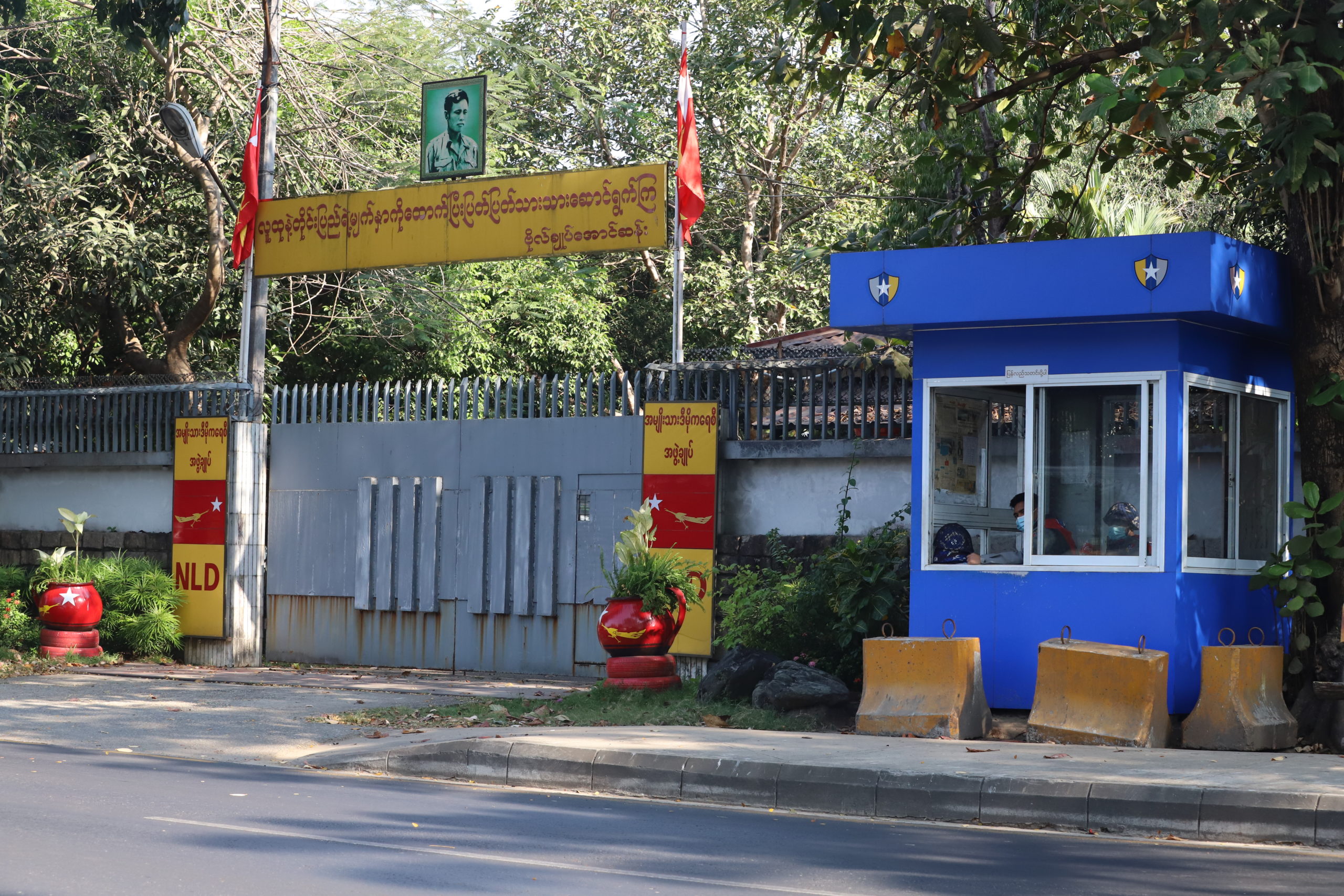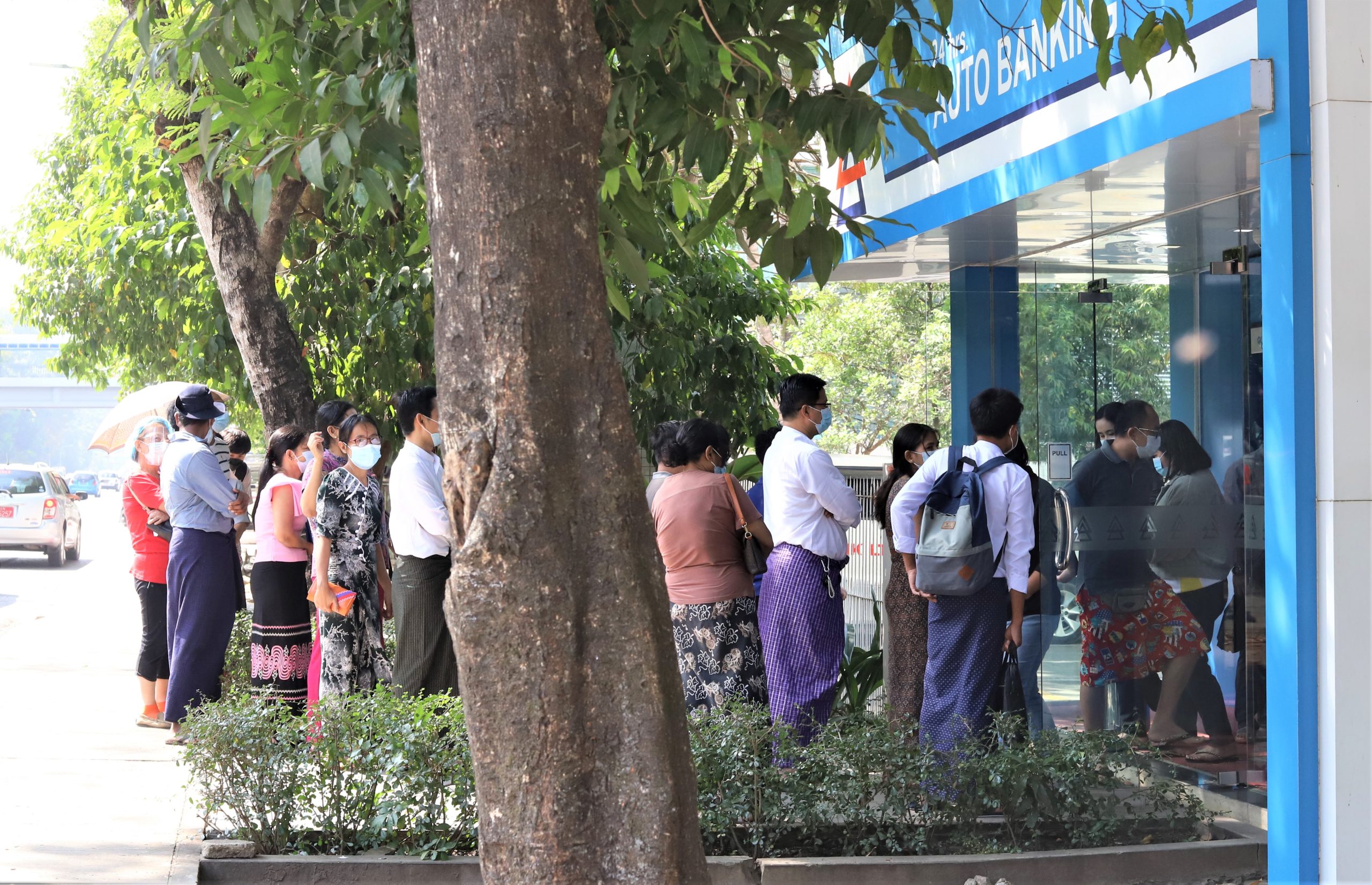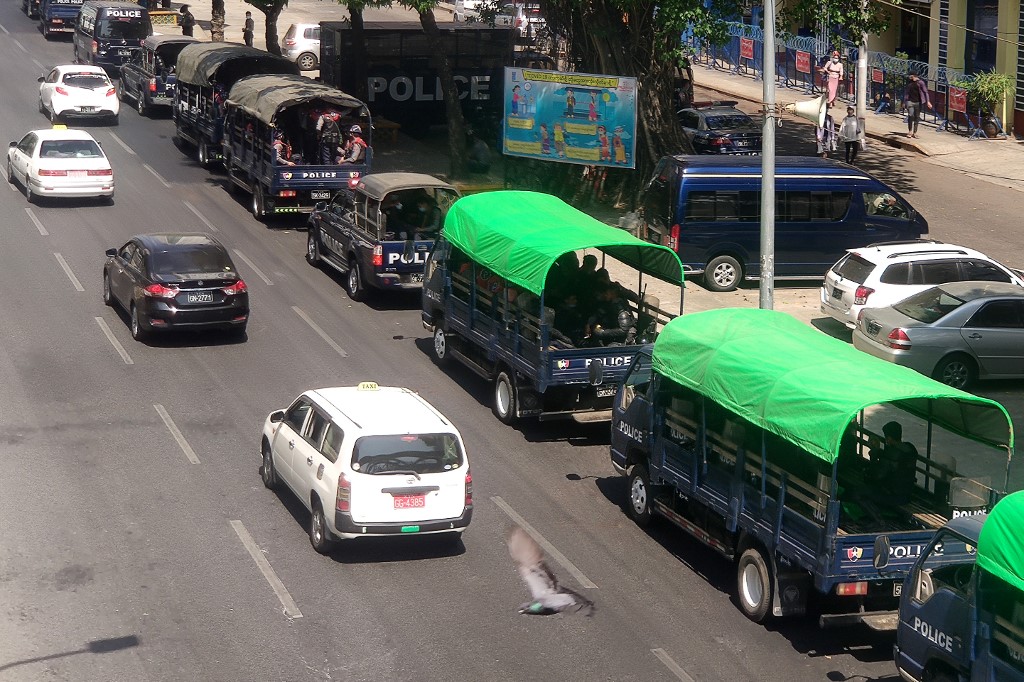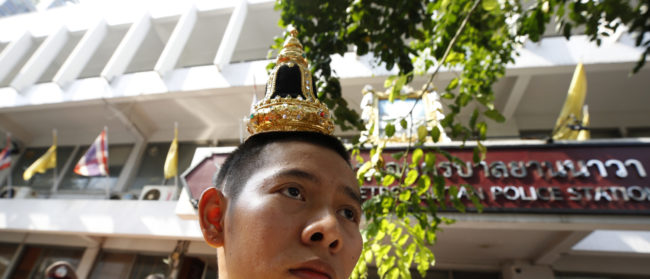Fear and tension gripped the streets of Myanmar on February 1 after the country’s military staged a coup toppling the civilian leadership of the National League for Democracy (NLD) and instating a year-long state of emergency.
Shortly thereafter, reports began surfacing of mass arrests, including those of President Win Myint and NLD party leader, State Counsellor Aung San Suu Kyi, as a result of unfounded accusations of widespread voter fraud in the 8 November elections.
“As if Covid-19 hasn’t made it hard enough, now we have this military coup,” bemoaned Mr Kaw, a Yangon-based taxi driver in his late forties in the city, who went by his family name. Kaw has already survived one coup at personal cost and now worries about the future for his children.
Kaw is not alone with these fears.
“In 1988 we had witnessed the brutality of the military,” said a person buying goods in bulk at a local supermarket, going by the name Sammy. “Since 2015, I never thought we would ever go back to witness that. But I was wrong.”
The first signals of unrest began in the capital Naypyidaw as internet and mobile data services were cut. Soon after, residents across Yangon awoke to similar news. International media outlets, including the BBC and CNN were blocked as well, with residents having no choice but to tune in to the military-owned Myawaddy channel for updates. While rumours swirled that communications would be even more tightly controlled, as of Monday, a full shutdown never came.
Military representatives had accused the Union Election Committee of failing to adequately regulate voter lists and alleged that the NLD’s failure to postpone parliament until the supposed discrepancies were resolved would threaten the democratic stability of the country.
Defending their decision, the military has cited Article 417 of the constitution in which “acts or attempts to take over the sovereignty of the Union by wrongful forcible means” could lead to the disintegration of national solidarity.
While the country awaits future developments, unsure of what’s to come amidst mounting political turmoil, it didn’t take long for people to begin despairing about the long-term implications of what’s unfolding.
Military chief and, now, de facto national leader General Min Aung Hlaing had previously been set to retire in July 2021, leading many to assume that Monday’s events were a last-ditch effort for the military to hold power after the landslide 2020 elections delivered a substantial blow to the military-backed Union and Solidarity Party (USDP).
The USDP only managed to secure 30 seats in parliament, (down from 117 in 2015), suggesting that popular support for the country’s armed forces was decreasing.
In the past, following crackdowns and protests, supporters have often gathered at the NLD’s original headquarters in front of Suu Kyi’s famed colonial manor on University Ave.
“You want photos, sure, the action will be outside Aung San Suu Kyi’s official home,” Kaw said as he navigated Yangon with a reporter, “the military will be everywhere!”
Though armoured military vehicles were spotted elsewhere around town on hushed streets, the roads to Suu Kyi’s house were still busy with signs of normalcy, including a stream of taxis, buses and rickshaws. Life appears to be plodding along as usual. Outside the leader’s official house sat her usual security guard, his eyes drilled into his phone, all alone.
“Where is the military?” asked Kaw.

Without reliable internet and cell service, it’s difficult to understand what exactly is happening and what the coming days will entail for those in Myanmar. Rumours continue to circulate about the detention of politicians and leaders across the country.
In the streets, people discussed the day’s events, trying to piece together as much information as possible. Most chose to speak in hushed voices, and some who were able to communicate online were fearful that any information they shared could make them a target.
At the end of the first day, it was unclear whether the military will be making more arrests in the coming days. But for now, many are preparing for the worst.
NLD supporters hurried to pull down party flags from the balconies of their homes, said Andrew Nachemson, a reporter with Yangon-based news outlet Frontier Myanmar, lest they be targeted by the military or its supporters.
“After the military first started making their threats, a bunch of houses all over the city started putting out NLD flags on their balconies. And then you started seeing community banners going up saying ‘We support the lawfully elected government’,” he said.
“Those individual flags have gone down, but the community banners are staying up. My guess is if you have a flag hanging outside your home, then you can be identified individually as a supporter of the NLD.”
You can see people visibly stiffen when those caravans go by. I’m worried that could create tension that could become violent
Nachemson added that a climate of fear was setting in as military supporters began roving around the city.
“We’re seeing some caravans of pro-military supporters driving around the city waving flags, blaring music,” he said. “You can see people visibly stiffen when those caravans go by. I’m worried that could create tension that could become violent.”
For Myanmar’s weary population, the military takeover threatens to undo any democratic progress that’s been made since the country’s first elections in 2010, during which the military retained control of the presidency but permitted civilian candidates to run for seats in parliament.
In the 2015 elections Suu Kyi’s NLD came out victorious, securing a majority in parliament as well as control of the Office of the President. This margin was extended in the 2020 elections with the NLD securing more than 80% of the vote in a poll held amidst, what was then, a spiralling health crisis.
Today, while Myanmar appears to be emerging from the devastating health problems of Covid-19 that spiked in October and November, the economic situation remains dire.
“Many people, so many people are hungry and sick already, there is no work, no one has money,” said taxi driver Kaw.
As uncertainty over the political and economic situation heightened throughout Monday, anxiety drove residents into a run on banks and ATMs to withdraw cash. Kaw points to a long queue in front of one ATM where more than a dozen people huddled closely, waiting to withdraw money as news trickled out about banks closures throughout the city.

Crowds of people similarly rushed to grocery stores and markets to stock up on food and supplies as they shared notes on the situation.
“When the news broke, people started going to the wet markets. There were lots of people, most of them panicking and worrying about what was going on. They were stocking up on things like rice and oil, any food,” explained a Burmese, Yangon-based journalist who wished to remain anonymous.
What Myanmar now possibly faces is the return of heavy international sanctions and apprehension on the part of Western investors, weary of a regression to the oppressive climate of previous decades.
“I was twenty years old in 1988, I couldn’t go to university, I couldn’t get a job,” Kaw said about the previous military takeover that crushed the popular student uprisings that emerged in August of that year.
During this pandemic time people are really panicked, and there is a growing fear and concern about starvation
Even before this latest political upheaval, concerns were growing around food shortages and economic instability, with Yangon, the commercial capital of Myanmar and its largest city, battered by closures and lockdowns implemented to curb the spread of Covid-19.
But beyond the country’s major metropolises, particularly in ethnic minority areas, the picture is even more dire, says Wai Wai Nu, a human rights advocate from Rakhine state and the founder of the Women’s Peace Network.
“During this pandemic time people are really panicked, and there is a growing fear and concern about starvation,” she told the Globe. “[There is also] concern about a cut in communication and increasing militarisation in ethnic areas. People are really really starting to panic.”

Following hours of silence from the NLD, a statement was released on the party’s Facebook page, allegedly written by Suu Kyi. In the post, she tells her supporters not to accept the coup and instead protest the military’s actions.
The statement was released by NLD Chairman Win Htein who, in an effort to lend credibility to the post, included a handwritten note at the bottom of the page stating: “On my life I swear, that this request to the people is Aung San Suu Kyi’s genuine statement.”
While the authenticity of the post has yet to be confirmed, some are anticipating that protests could erupt in the coming days as the military attempts to tighten its hold, further feeding into the uncertainty surrounding the country’s future stability.
“People really support the NLD and they’re not happy about what’s happening here,” Nachemson said, though he added the notice is being interpreted warily by some, unsure of its authenticity.
In the meantime, it appears the only supporters taking to the streets are nationalists eager to celebrate a return to military rule. Others seem more guarded at the present, frightened about the risk of consequence of their actions.
“The NLD needs to call more emphatically for protests before they can really spur everyone to action. But I do think [the people] would respond if they were told to protest,” Nachemson said.
Additional reporting by Harriet Bay, Andrew Haffner and Alastair McCready


